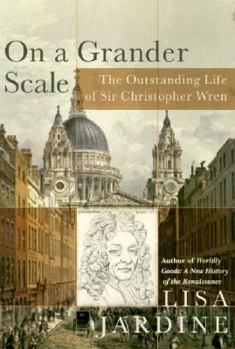On a Grander Scale: The Outstanding Life and Tumultuous Times of Sir Christopher Wren
Select Format
Select Condition 
Book Overview
Trough the prism of the tumultuous life and brilliant intellect of Sir Christopher Wren, the multitalented architect of Saint Paul's Cathedral in London, historian Lisa Jardine unfolds the vibrant, extraordinary emerging new world of late-seventeenth-century science and ideas.
The man behind the bold, imposing beauty of Saint Paul's was as remarkable as the monuments he has left us. Wren was a versatile genius who could have pursued a number of brilliant careers with equal virtuosity. A mathematical prodigy, an accomplished astronomer, a skillful anatomist, and a founder of the Royal Society, he eventually made a career in what he described disparagingly in later life as "Rubbish " -- architecture, and the design and construction of public buildings.
Wren was a major figure at a turning point in English history. He mapped moons and the trajectories of comets for kings; lived and worked under six monarchs; pursued astronomy and medicine during two civil wars; exercised his creativity through the English Commonwealth, the Great Fire, the Restoration. His royal employment out lasted abdication, Dutch invasion, and the eventual extinction of the Stuart dynasty.
Beyond the public achievements, Jardine explores Wren's personal motivations and passions. He was a sincere, intensely moral man with a remarkable capacity for friendship. His career was shaped by lasting associations forged during a turbulent boyhood and a lifelong loyalty to the memory of his father's master and benefactor, the "martyred king," Charles I.
Everything Wren undertook, he envisaged on a grander scale -- bigger, better, more enduring than anything that had gone before.






